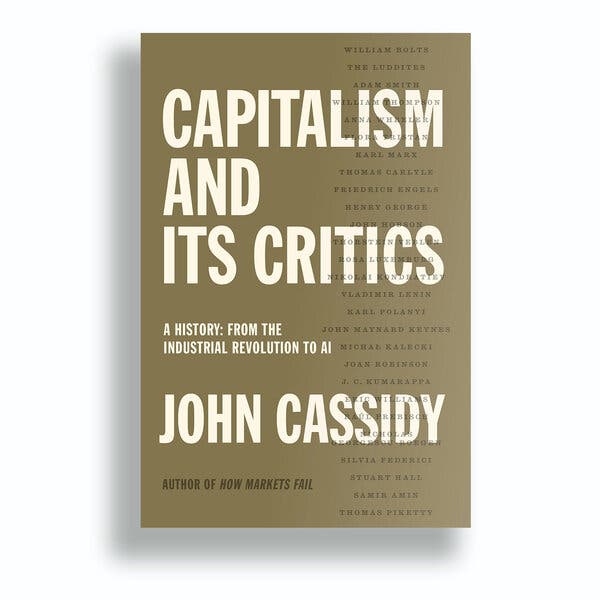CAPITALISM AND ITS CRITICS: A History: From the Industrial Revolution to AI, by John Cassidy
Given how reliably Americans tend to favor promises of plenty, it has been curious to see a president inherit a humming economy and then proceed to gut the federal work force, start a chaotic trade war and celebrate the scarcity about to ensue. Asked about potential shortages of goods, President Trump has repeatedly offered versions of the same strange example. “I don’t think a beautiful baby girl needs — that’s 11 years old — needs to have 30 dolls,” he told NBC News. “I think they can have three dolls, or four dolls.” (He added, “They don’t need to have 250 pencils, they can have five.”)
Trump makes a few cameo appearances in John Cassidy’s new book, “Capitalism and Its Critics,” for his demonstrated ability to brag about his riches while tapping into growing discontent with the global capitalist system. Some of the critics Cassidy features in this book wanted to replace capitalism entirely; others, like Trump, have sought to preserve a core of self-interest while remaking capitalism’s rules. Rejecting a world financial order fueled by free trade and a bedrock American dollar, the president has been promoting a grab bag that includes both tariffs and crypto — a Trumpian hybrid of the very old and the very new.
But then capitalism has always been a protean force. In the 18th century, merchant capitalism yielded to industrial capitalism; in the postwar era, Keynesianism yielded to neoliberalism. Cassidy, a longtime staff writer for The New Yorker, originally envisioned writing a “shortish history” that began with the collapse of the Soviet Union, but he soon realized that to properly understand the roots of capitalism’s discontents, he needed to go much further back (some 250 years) and write much longer (more than 600 pages).
Despite the obvious differences among the people in this book, they share some complaints. “Over the centuries,” Cassidy writes, “the central indictment of capitalism has remained remarkably consistent: that it is soulless, exploitative, inequitable, unstable and destructive, yet also all-conquering and overwhelming.”
Cassidy begins in the early days of the Industrial Revolution and ends with some thoughts about the economic upheaval that may be wrought by A.I. In between he offers short chapters — 28 in all — dedicated to the life and work of figures both familiar and obscure. The result is an expansive history of capitalism that places less emphasis on economic abstractions like perfectly competitive markets and draws attention instead to how often capitalist systems have fallen short. “It is barely hyperbole to say that capitalism is always in crisis, recovering from crisis or heading toward the next crisis,” Cassidy remarks. In 1857, a financial panic on Wall Street prompted Marx and Engels to believe that a collapse was imminent. “The American crisis,” Marx wrote, “is BEAUTIFUL.” Engels replied, “The AMERICAN CRASH is superb.”





